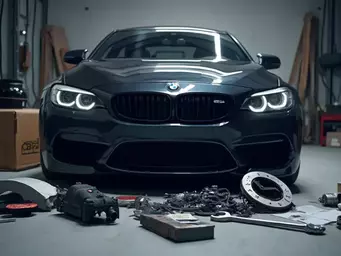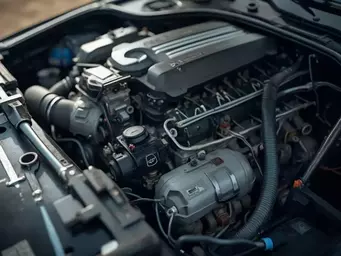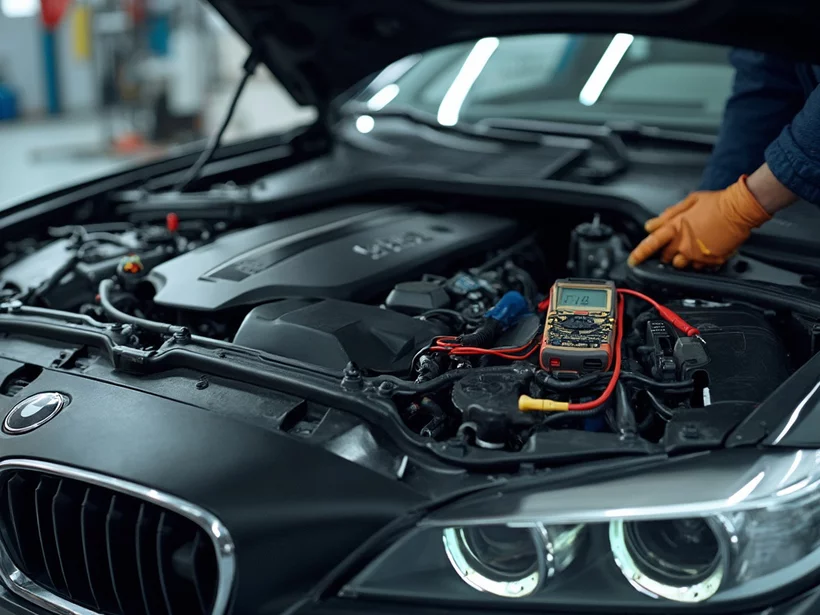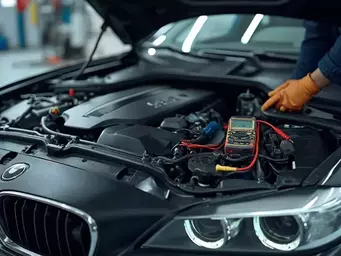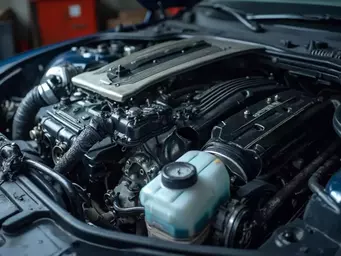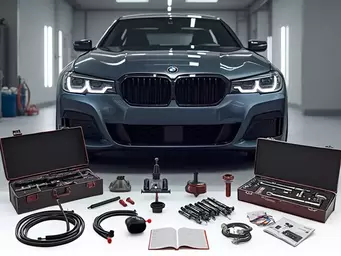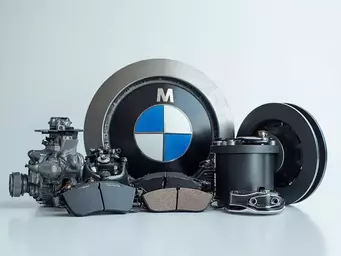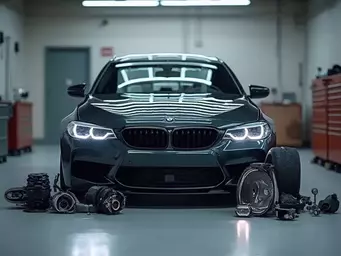Choosing BMW Spare Parts Wisely
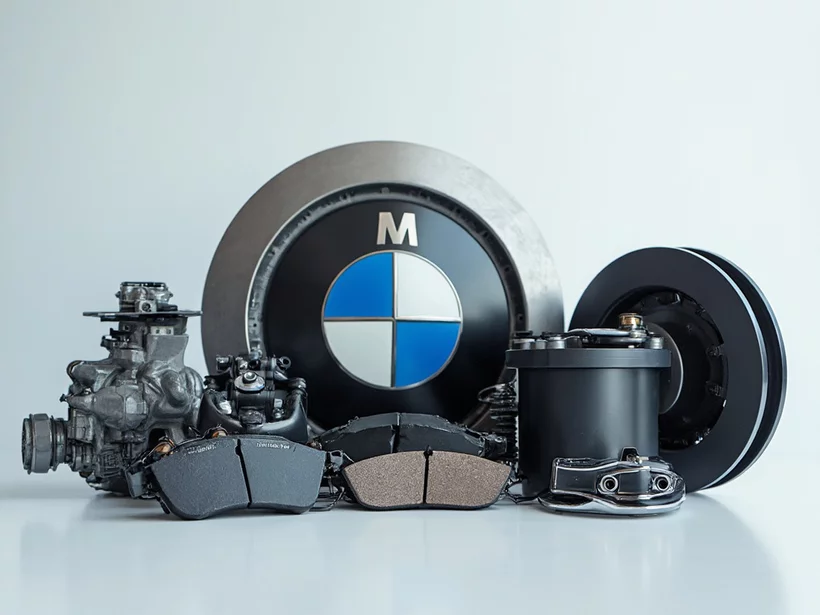
Did you know that the right spare parts can significantly enhance your BMW's performance and ensure your safety on the road? Let's dive into the critical aspects of selecting BMW spare parts to keep your vehicle in top shape.
What You Will Learn
- Choosing high-quality parts enhances your BMW's performance and safety.
- Understanding the differences between OEM, aftermarket, genuine, and used parts is crucial for informed decisions.
- Compatibility with your specific BMW model is vital to avoid installation issues.
- Researching parts and reading reviews can help you identify reliable aftermarket options.
BMW Spare Parts: Type Comparison and Impact
Understanding the key differences between various BMW spare part types is crucial for maintaining your vehicle's performance and longevity. This comparison highlights their unique advantages and considerations.
OEM Parts: Quality & Authenticity
- ✓Guaranteed Compatibility
- ✓Manufacturer Warranty
- ✓Highest Quality Standards
**Price:** High | **Quality:** Excellent
Aftermarket Parts: Variety & Value
- ●Cost-Effective Options
- ●Wider Variety Available
- ●Quality Can Vary Greatly
**Price:** Variable | **Quality:** Variable
Genuine Parts: Manufacturer Assurance
- ✓Warranty Protection
- ✓Maintains Resale Value
- ✓Reliable Performance
**Price:** High | **Quality:** Excellent
Used Parts: Eco-Friendly & Economical
- ★Significant Cost Savings
- ★Reduced Environmental Impact
- ★Variable Condition Requires Care
**Price:** Low | **Quality:** Variable
Understanding the Importance of Choosing the Right BMW Spare Parts
When it comes to maintaining your BMW, choosing the right spare parts is crucial. Not only do the right parts ensure optimal performance, but they also play a significant role in your vehicle's safety. As someone who has spent years in the automotive industry, I can tell you that making informed choices about spare parts can save you time, money, and frustration down the line!
Every BMW owner wants their vehicle to run smoothly and efficiently. By selecting quality parts, you're investing in your vehicle's longevity and overall driving experience. So, what should you consider when choosing spare parts for your beloved BMW?
Why Spare Parts Selection Matters for BMW Performance and Safety
First and foremost, the components you choose directly impact your BMW's performance. Using subpar parts can lead to mechanical failures, reduced efficiency, and even safety hazards. It’s essential to recognize that your choice of spare parts is not just about functionality; it’s about keeping you and your passengers safe on the road.
- Performance: High-quality parts enhance the driving experience.
- Safety: Reliable components reduce the risk of mechanical failure.
- Durability: Quality parts stand the test of time and wear.
By prioritizing quality in your parts selection, you're ensuring that your BMW continues to perform like the precision-engineered machine it is!
Overview of Common BMW Spare Parts Needs
As a BMW owner, you may encounter various spare parts needs over time. Whether you’re tackling routine maintenance or dealing with unexpected repairs, understanding what to look for is key. Here are some common parts that often require replacement:
- Brake pads and rotors
- Filters (oil, air, fuel)
- Suspension components
- Belts and hoses
- Engine components
Having a clear idea of these components can help you navigate your parts selection process more effectively. Remember, each part plays a vital role in keeping your BMW running at its best!
Key Factors in BMW Parts Compatibility and Quality Assurance
Ensuring that the parts you select are compatible with your specific BMW model is vital. Factors such as the model year, engine type, and trim can significantly affect part compatibility. Before making a purchase, it’s wise to verify these details to avoid potential issues during installation.
- Model Compatibility: Always check that parts match your specific model.
- Quality Standards: Look for parts that meet or exceed OEM specifications.
- Warranty: Ensure the parts come with a warranty for added peace of mind.
By focusing on compatibility and quality assurance, you're setting yourself up for success in maintaining your BMW. Trust me, it’s worth taking the time to do it right!
We Want to Hear From You!
What has been your experience with choosing BMW spare parts? Have you faced any challenges or found great solutions? Share your thoughts below:
Key Differences Between BMW Spare Part Types
When it comes to maintaining your BMW, understanding the different types of spare parts is essential. Each type of part offers unique advantages and drawbacks, which can significantly impact your vehicle's performance and longevity. Here’s a closer look at the key differences between OEM parts, aftermarket parts, genuine parts, and used parts.
OEM Parts: Quality and Authenticity Explained
OEM stands for Original Equipment Manufacturer, meaning these parts are created by the same company that made your vehicle's original components. This guarantees a perfect fit and reliable performance! One of the main reasons to choose OEM parts is to ensure your BMW maintains its performance and warranty. They are often more expensive, but the quality is usually unmatched.
- Guaranteed Compatibility: OEM parts are designed specifically for your BMW model.
- Warranty Coverage: Many OEM parts come with a manufacturer warranty.
- Quality Assurance: These parts are made to the same standards as your original components.
In my experience, while OEM parts might be pricier, they can save you money in the long run by reducing the chances of needing replacements due to inferior quality.
Aftermarket Parts: Pros and Cons
Aftermarket parts are produced by third-party companies and can offer a wider variety of choices at lower prices. However, their quality can vary significantly. Before opting for aftermarket parts, it’s crucial to research the manufacturer and read reviews from other BMW owners.
- Cost-Effective: Often less expensive than OEM parts.
- Variety: You might find performance upgrades or custom options that aren't available in OEM.
- Quality Concerns: Not all aftermarket parts meet the same quality standards as OEM.
Be sure to weigh the benefits and drawbacks carefully, as choosing a reputable aftermarket brand can lead to satisfactory results!
Genuine Parts vs. Aftermarket: What You Need to Know
It’s important to differentiate between genuine parts and aftermarket parts. Genuine parts come directly from the manufacturer and are the same as OEM in terms of quality. For instance, BMW Remanufactured Parts are genuine parts that offer exceptional quality and value. However, they might be sold under a different name. On the other hand, aftermarket parts vary widely in quality and price. Choosing genuine parts ensures you receive the same level of quality as the original components.
- Warranty Protection: Genuine parts often include a warranty.
- Higher Resale Value: Using genuine parts can help maintain your BMW's value.
- Performance Reliability: Designed to meet or exceed the original specifications.
In the long run, opting for genuine parts typically offers peace of mind and assurance that you’re maintaining your BMW to the highest standards.
Used Parts: Cost-Effective Options with Environmental Benefits
Used parts can be a great way to save money while also being environmentally conscious. They are often significantly cheaper than new parts and can be just as reliable if sourced from reputable sellers. However, it’s essential to check the condition of used parts thoroughly.
- Cost Savings: Typically much less expensive than new parts.
- Environmental Impact: Reusing parts reduces waste and helps the planet.
- Variable Quality: Be cautious and ensure parts are in good condition.
If you're considering used parts, I recommend checking local salvage yards or online marketplaces that specialize in automotive parts. You’ll often find great deals that won’t compromise your BMW’s integrity!
Comparison Table: OEM vs. Aftermarket vs. Used Parts
| Part Type | Price | Quality | Warranty | Compatibility |
|---|---|---|---|---|
| OEM | High | Excellent | Yes | Perfect Fit |
| Aftermarket | Variable | Variable | Sometimes | May Vary |
| Used | Low | Variable | No | Condition Dependent |
By understanding the distinctions between these various types of parts, you can make informed decisions that will keep your BMW running smoothly and efficiently! Choosing the right type of parts is a crucial step in maintaining the performance and safety of your vehicle.
Frequently Asked Questions about BMW Spare Parts
Q: Why is choosing the right spare part for my BMW important?
A: Choosing the right spare part is crucial for maintaining your BMW's optimal performance, ensuring your safety on the road, and preserving the vehicle's longevity. Subpar parts can lead to mechanical failures and safety hazards.
Q: What are OEM parts and why should I consider them?
A: OEM (Original Equipment Manufacturer) parts are made by the same company that produced your BMW's original components. They guarantee a perfect fit, reliable performance, and often come with a manufacturer warranty, ensuring the highest quality standards.
Q: What are the pros and cons of aftermarket parts?
A: Aftermarket parts are generally more cost-effective and offer a wider variety, sometimes including performance upgrades. However, their quality can vary significantly, so thorough research on the manufacturer and reviews is essential.
Q: How do genuine parts differ from aftermarket parts?
A: Genuine parts come directly from the manufacturer and are equivalent to OEM in quality, often including warranty protection. Aftermarket parts are produced by third-party companies and can vary greatly in quality and price, potentially not meeting original specifications.
Q: Are used parts a good option for my BMW?
A: Used parts can be a cost-effective and environmentally friendly option. However, it's vital to thoroughly check their condition and source them from reputable sellers to ensure they won't compromise your BMW's integrity.
Q: How can I ensure compatibility when choosing BMW spare parts?
A: Always verify that the parts match your specific BMW model, including the model year, engine type, and trim. This prevents installation issues and ensures the part functions correctly with your vehicle.
Recap of Key Points
Here is a quick recap of the important points discussed in the article:
- Choosing the right spare parts is essential for optimal performance and safety of your BMW.
- Prioritize quality by selecting OEM or genuine parts that ensure compatibility and reliability.
- Research aftermarket parts thoroughly, as their quality can vary significantly.
- Familiarize yourself with common spare parts needs to streamline your maintenance process.
- Consider used parts as a cost-effective option, but ensure they are in good condition.

